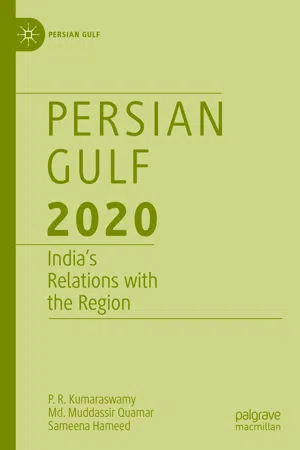Regional crises and tensions with sporadic escalations continued to undermine the stability of the Persian Gulf during 2019. There was no end in sight for the conflict in Yemen and the GCC (Gulf Cooperation of Council) crisis. Tensions between the US and Iran heightened, raising speculations of a military confrontation. The year witnessed India holding the 17th Lok Sabha elections, which slowed the pace of political engagements between India and the Persian Gulf, but later part of the year saw a spate of meetings, especially with three high-level meetings between Prime Minister Narendra Modi and Saudi Crown Prince Mohammed bin-Salman. In February, Riyadh emerged as a possible go-between India and Pakistan as tension increased following the Pakistan-backed terror attack in Pulwama on 14 February1 and India’s retaliation on Balakot on 26 February.2 Iran’s heightened tension with the US adversely affected the Indo-Iranian relations and brought India’s energy imports from that country to a stop.3
In May, Prime Minister Modi was re-elected with a larger mandate than 2014 and this signalled the continuity of India’s Gulf policy. At the same time, some of India’s domestic policy choices evoked negative feelings in the region and underscored the domestic-foreign policy linkages. Moreover, the goodwill that India managed to generate in the region, especially among the Gulf Arab countries, since 2014 has not yet been converted into tangible gains. Capitalizing on the positive vibes through political exchanges for tangible economic and strategic gains would be India’s most critical challenge in the coming years.
Regional Developments
Tensions and tussles continued to keep the Persian Gulf region on the boil during 2019. Acrimony and blame-trading exacerbated many of the prevailing tensions and crises. Neither the regional players nor the great powers have exhibited any sagacity in addressing some of the burning issues of the region. To a large extent, the Trump administration continues to be a spoiler in regional politics.
US-Iran Tensions
The US policy of “maximum pressure”4 formally outlined on 8 May 2019 has undone the years of diplomacy that sought to bring Iran into the global mainstream and achieve stability in the Persian Gulf. The Trump Administration’s 8 May 2018 decision to withdraw from the Iran nuclear deal or Joint Comprehensive Plan of Action (JCPOA)5 was accompanied by the US imposing more stringent sanctions on Iran.6 These, in turn, changed the regional dynamics; the US-Iran relations shifted from diplomacy to confrontation. As the US sanctions led to economic hardships, internal unrest and divisions, the clergy-led regime became more belligerent and resolute.7 The hardliners in Iran cited the Trump Administration’s policy to push for security-oriented domestic and regional policies.8 This gave the moderate Rouhani government limited space to manoeuvre its policy of outreach to the West and has forced it to emb...
